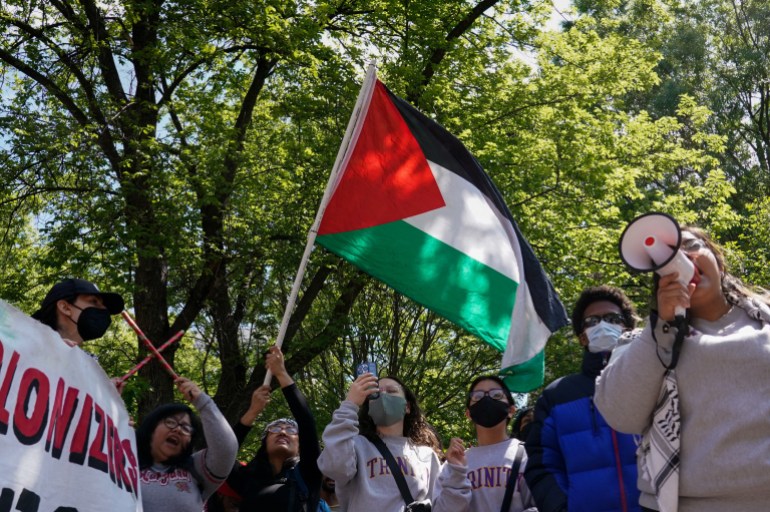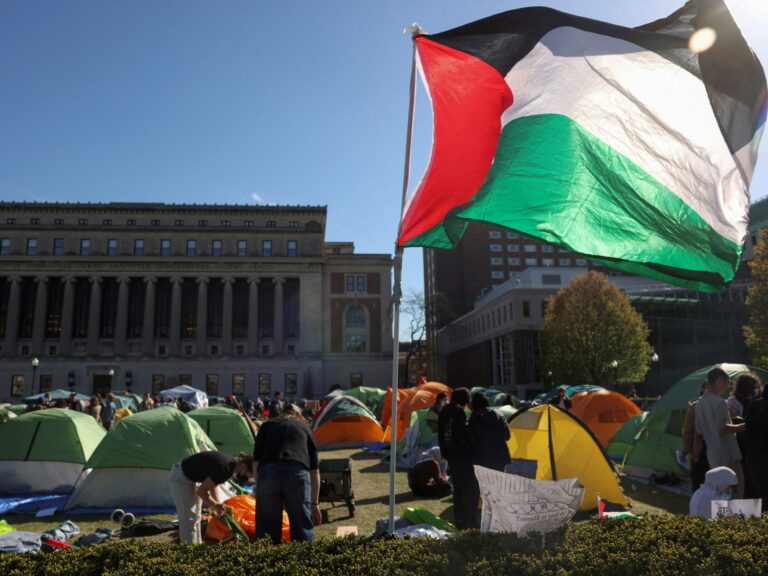Washington DC – A campus centered on Gaza protest movement in the United States has highlighted a generational divide toward Israel, experts say, with young people’s willingness to challenge politicians and university administrators showing up across the country.
The gap in opinion – with younger Americans generally more supportive of the Palestinians than generations before them – poses a risk for the 81-year-old Democratic president. That of Joe Biden chances of re-election, they say.
It could also threaten the bipartisan support Israel enjoys in Washington.
“We’re already seeing signs of a generational divide regarding Israel, and that’s going to be a long-term problem for the Democratic Party,” said Omar Wasow, an assistant professor of political science at the University of California, Berkeley.
“These protests are accelerating the generation gap,” Wasow told Al Jazeera.
Students at Columbia University in New York held a Palestine solidarity camp last week, and since then they have faces arrests and other disciplinary measures after the college administration called on police to evacuate the protest.
Yet despite the crackdown, similar encampments have sprung up across the United States, as well as in other countries.
Images of students, professors and journalists violently arrested by police on different campuses sparked outrage but did little to slow the momentum of the protests, which continued to spread.
“Moment of inflection”
Students They are widely demanding that their universities disclose their investments and withdraw all funds from arms manufacturers and companies involved in the Israeli military.
Politicians from both major U.S. parties, as well as the White House and pro-Israel groups, have accused the students of fueling anti-Semitism — allegations that protesters vehemently deny.
Eman Abdelhadi, a sociologist at the University of Chicago, said young people are increasingly frustrated with the status quo on domestic and foreign policy issues.
“I think there is a real disaffection with the older generation, but especially with the system that they run,” Abdelhadi said.
She added that the protests mark a “moment of inflection” in American public opinion in general.
“In American history in general, big shifts in public opinion have usually coincided with or been triggered by large student movements,” Abdelhadi told Al Jazeera.
She said campus activism can be the basis for political change. “There’s kind of a feeling that this is the future.”

Biden’s woes
For years, the public opinion polls in the United States suggest that young people are more likely to sympathize with the Palestinians and criticize Israel.
But Americans as a whole have grown more critical of Israel’s treatment of the Palestinians, particularly in the context of the ongoing war against Gaza.
Several polls suggest that a majority of respondents in the United States support a permanent ceasefire in the besieged Palestinian enclave, where Israel has killed more than 34,000 Palestinians since the conflict began on October 7.
But Biden maintained his unwavering support for Israel, the United States’ main ally in the Middle East, the war.
The 81-year-old president’s stance could be politically costly as Biden faces a tough re-election bid in a November election that is expected to pit him against his Republican predecessor, Donald Trump.
Polls suggest Biden will have to appeal to his Democratic Party base, which is not as united in support for Israel as the Republican Party.
Angus Johnston, a historian of American student activism, explained that the generation gap on Israel is particularly pronounced among Democrats.
“Nationally, we’ve seen this for some time as a mismatch between the values of young voters and those of most Democratic politicians,” Johnston told Al Jazeera.
“And what we’re seeing today is a similar disconnect between young people on campuses and many of the administrators who run those campuses, as well as alumni and donors.”
Abdelhadi, the sociologist, added that law enforcement’s authoritarian approach to solidarity protests in Gaza has undermined Democrats’ argument that electing Biden would protect the nation from Trump, whom they accuse of authoritarianism.
“The reality is that Democrats are telling us that young people must save democracy and people of color must save democracy and that any differences with the current administration must be put aside to save democracy,” he said. she told Al Jazeera. .
“But where is democracy when state troopers beat students and faculty for protesting, and the White House says nothing about it?”
Wasow also said the protests and the crackdown on them could worsen apathy toward Biden.
“Democrats can’t really afford to give people more reasons to vote against Biden, and this is becoming one of them.”
Policy change
The student protesters, however, do not get involved in American partisan politics. Instead, they emphasized that their demands are intended to help protect the human rights of Palestinians.
So can the protests help bring about changes in US policy and achieve their demands for divestment?
Historian Johnston believes that American universities are unlikely to divest from big business and the defense industry in the short term, but the call for transparency in their investments is reasonable.
He added that long-term change is possible, but it won’t happen overnight.
“We have seen time and time again that student organizing changes policy, not always quickly and not always in the ways students would have hoped,” Johnston said.
“But we find that when student organizing reaches a certain level of intensity, it can have a significant effect. »
For example, he said that academic activism against apartheid in South Africa started in the 1950s and has grown over the years.
“I think there is no doubt that anti-apartheid campus organizing in the 1980s played an important role in the evolution of American popular opinion and political opinion toward the regime South African,” he said.
Wasow, who studied the 1960s civil rights demonstrationsalso said protests could change public opinion, help develop political coalitions around a cause, and build civic capacity to advance an issue.
“If what’s happening now doesn’t result in any political change but causes a generation of young people to develop some sort of civic capacity around activism around these issues, I think it will continue to have long-term effects. »


